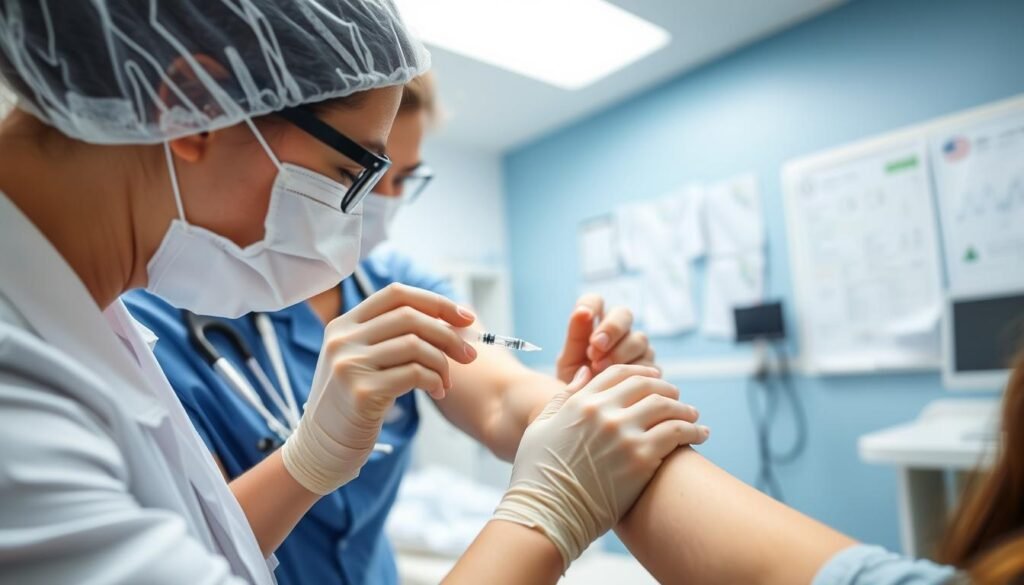Have you ever noticed a suspicious mole or lesion on your skin and wondered where to turn for a quick evaluation? With skin cancer concerns on the rise, it’s essential to know your options for diagnosis.
Urgent care centers are a convenient option when you need medical attention quickly, but it’s not an absolute emergency. They serve as an intermediate healthcare option between primary care doctors and emergency rooms, offering extended hours and walk-in availability for various medical concerns, including skin problems.
While urgent care facilities can provide initial assessments, understanding their capabilities and limitations for skin cancer detection is crucial for making informed healthcare decisions about your health.
Key Takeaways
- Urgent care centers can provide initial assessments for suspicious skin lesions.
- Dermatologists specialize in comprehensive skin cancer screening and diagnosis.
- Urgent care doctors can offer appropriate referrals for further evaluation.
- Understanding the capabilities of urgent care centers is crucial for informed healthcare decisions.
- Fit Glow Guide is here to help you navigate your skin health journey.
Understanding Urgent Care Services for Skin Issues
Urgent care facilities provide immediate attention for a range of skin conditions, making them a valuable healthcare resource. These centers are staffed by healthcare professionals who can diagnose and treat various conditions, offering benefits such as accessibility, convenience, and cost-effectiveness.
What Urgent Care Centers Can Diagnose
Urgent care centers are equipped to diagnose common skin conditions, including infections, allergic reactions, and rashes. The healthcare providers at these centers have the training to identify potentially concerning skin changes and determine if further evaluation by a specialist is needed.
Equipment and Expertise Available
While urgent care centers may not have specialized dermatological equipment like dermatoscopes, they are equipped with basic diagnostic tools such as magnifying devices and good lighting for visual inspections. This enables healthcare providers to perform initial assessments and decide on the next steps for patient care.
| Service | Description | Availability |
|---|---|---|
| Basic Diagnostic Tools | Magnifying devices and good lighting for visual inspection | Available at most urgent care centers |
| General Medical Training | Physicians and advanced practice providers trained to recognize common skin conditions | Standard at urgent care facilities |
| Extended Hours | Evenings and weekends, providing accessibility beyond regular office hours | Typical for urgent care centers |

Can Urgent Care Check for Skin Cancer?
The question of whether urgent care can check for skin cancer is a common one. While urgent care centers can provide initial assessments for various health concerns, their capability to diagnose skin cancer is limited.

Initial Assessments vs. Definitive Diagnosis
Urgent care physicians can perform preliminary visual examinations of suspicious skin lesions. They can provide an initial assessment of potential skin cancer concerns. However, a definitive diagnosis typically requires the expertise of a dermatologist.
The primary role of urgent care in skin cancer detection is to serve as a first point of evaluation and referral to dermatologists who specialize in skin cancer diagnosis and treatment.
Limitations of Urgent Care for Skin Cancer Screening
Urgent care facilities lack the specialized equipment and expertise that dermatologists possess for comprehensive skin cancer screening. For patients concerned about potential skin cancer, urgent care can be a starting point, but it should not replace a thorough evaluation by a dermatologist as part of your complete healthcare journey.
A doctor at an urgent care center can identify concerning moles or growths, but a biopsy, which is rarely performed in urgent care settings, is often necessary for a definitive diagnosis of a condition.
Common Skin Conditions Treated at Urgent Care
When it comes to skin health, urgent care centers are a valuable resource for addressing acute conditions. Urgent care facilities are equipped to diagnose and treat a variety of skin issues, providing timely relief to patients.
Skin Infections and Rashes
Skin infections such as cellulitis and impetigo are commonly treated at urgent care centers. These infections can cause significant discomfort and, if left untreated, may lead to serious complications. Urgent care providers can offer antibiotic treatment to help manage these conditions. Additionally, rashes caused by contact dermatitis, hives, and eczema flare-ups can be effectively diagnosed and treated with appropriate medications.
Allergic Reactions and Insect Bites
Allergic reactions to medications, foods, or environmental triggers are frequently managed at urgent care centers. Treatments may include antihhistamines and steroids to reduce inflammation and itching. Insect bites and stings that cause significant swelling, pain, or allergic reactions can also be evaluated and treated at urgent care facilities.
Burns, Shingles, and Other Acute Conditions
Urgent care centers can diagnose and treat acute conditions such as shingles, minor burns, and chickenpox. For viral conditions, antiviral medications may be prescribed, while burns receive appropriate wound care to facilitate healing.

When to Choose Urgent Care vs. a Dermatologist
The decision to visit urgent care or a dermatologist for skin concerns should be based on the severity and nature of the condition. Understanding when to choose between these two options is crucial for receiving appropriate care.
Urgent Skin Issues: When Time Matters
For sudden skin issues that require immediate attention, such as rapidly spreading rashes or severe allergic reactions, urgent care is the way to go. If you’re experiencing a fever of 100.4 degrees or higher along with skin symptoms, urgent care can provide timely treatment. Urgent care centers are equipped to handle acute skin conditions that cannot wait for a dermatologist appointment.
Complex Skin Concerns: When Specialists Are Needed
Complex skin conditions like psoriasis, severe eczema, or suspicious moles require the expertise of a dermatologist. These specialists have the training and equipment to diagnose and treat a wide range of skin disorders. If you have a history of skin cancer or chronic skin conditions, it’s best to consult a dermatologist directly. Prioritizing a dermatologist visit can lead to more effective management of your skin health.
| Condition | Urgent Care | Dermatologist |
|---|---|---|
| Rapidly spreading rash | Recommended | Not necessary |
| Suspicious moles | Not recommended | Recommended |
| Severe allergic reactions | Recommended | Not necessary |
| Chronic skin conditions | Not recommended | Recommended |

What to Expect During a Skin Check at Urgent Care
Knowing what happens during a skin check at urgent care can make the experience less daunting. When you visit an urgent care center for a skin issue, you can expect a thorough assessment to determine the cause and appropriate treatment.
The Examination Process
During a skin check at urgent care, the doctor will first take your medical history, asking about when the skin issue started, associated symptoms, and any factors that worsen or improve the condition. The physical examination involves a visual inspection of the affected skin areas under good lighting, sometimes using magnification to better assess details of concerning lesions or rashes.
The doctor may also gently palpate the skin to check for tenderness, warmth, or other physical characteristics that help determine the nature of the condition.
Possible Outcomes and Next Steps
Possible outcomes from an urgent care skin check include immediate treatment for common conditions, referral to a dermatologist for specialized care, or recommendation for emergency care if symptoms suggest a serious condition. If the doctor suspects a potential skin cancer, they will typically recommend follow-up with a dermatologist who can perform specialized tests.
Here is a summary of when to seek urgent care for skin issues:
| Symptoms | Recommended Action |
|---|---|
| High-grade fever, sudden development and rapid spread of irritation | Visit urgent care |
| Coverage of 10% or more of the body, signs of infection | Seek immediate care at urgent care centers |
| Tightness in the chest or trouble breathing | Go to urgent care or emergency services |
By understanding what to expect during a skin check at urgent care, you can be better prepared to address your skin concerns and receive appropriate care.
Conclusion: Making Informed Decisions About Your Skin Health
Knowing when to visit an urgent care center for skin issues can significantly impact your overall health. Understanding the capabilities and limitations of urgent care for skin cancer screening empowers you to make informed choices about your skin health. While urgent care centers provide valuable services for acute skin conditions like infections, rashes, and allergic reactions, they should complement, not replace, care from a dermatologist for potential skin cancers. For optimal care, establish a relationship with both a primary care doctor and dermatologist. Fit Glow Guide encourages a proactive approach to skin health, including regular self-examinations and sun protection.
















